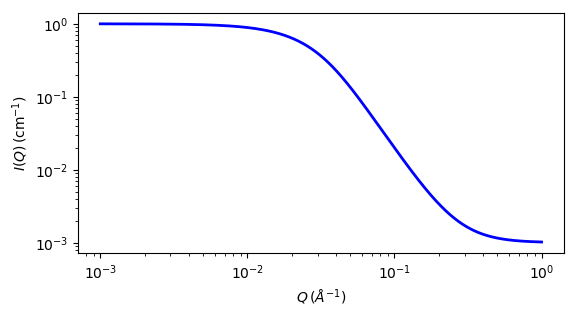polymer_excl_volume¶
Polymer Excluded Volume model
Parameter |
Description |
Units |
Default value |
|---|---|---|---|
scale |
Scale factor or Volume fraction |
None |
1 |
background |
Source background |
cm-1 |
0.001 |
rg |
Radius of Gyration |
Å |
60 |
porod_exp |
Porod exponent |
None |
3 |
The returned value is scaled to units of cm-1 sr-1, absolute scale.
This model describes the scattering from polymer chains subject to excluded volume effects and has been used as a template for describing mass fractals.
Definition
The form factor was originally presented in the following integral form (Benoit, 1957)
where ν is the excluded volume parameter (which is related to the Porod exponent m as ν=1/m ), a is the statistical segment length of the polymer chain, and n is the degree of polymerization.
This integral was put into an almost analytical form as follows (Hammouda, 1993)
and later recast as (for example, Hore, 2013; Hammouda & Kim, 2017)
where γ(x,U) is the incomplete gamma function
and the variable U is given in terms of the scattering vector Q as
The two analytic forms are equivalent. In the 1993 paper
has been factored out.
SasView implements the 1993 expression.
The square of the radius-of-gyration is defined as
Note
This model applies only in the mass fractal range (ie, 5/3<=m<=3) and does not apply to surface fractals (3<m<=4). It also does not reproduce the rigid rod limit (m=1) because it assumes chain flexibility from the outset. It may cover a portion of the semi-flexible chain range (1<m<5/3).
A low-Q expansion yields the Guinier form and a high-Q expansion yields the Porod form which is given by
Here Γ(x)=γ(x,∞) is the gamma function.
The asymptotic limit is dominated by the first term
The special case when ν=0.5 (or m=1/ν=2 ) corresponds to Gaussian chains for which the form factor is given by the familiar Debye function.
For 2D data: The 2D scattering intensity is calculated in the same way as 1D, where the q vector is defined as

Fig. 116 1D plot corresponding to the default parameters of the model.¶
Source
References
H Benoit, Comptes Rendus, 245 (1957) 2244-2247
B Hammouda, SANS from Homogeneous Polymer Mixtures - A Unified Overview, Advances in Polym. Sci. 106 (1993) 87-133
M Hore et al, Co-Nonsolvency of Poly(N-isopropylacrylamide) in Deuterated Water/Ethanol Mixtures, Macromolecules 46 (2013) 7894-7901
B Hammouda & M-H Kim, The empirical core-chain model, Journal of Molecular Liquids 247 (2017) 434-440
Authorship and Verification
Author:
Last Modified by:
Last Reviewed by: